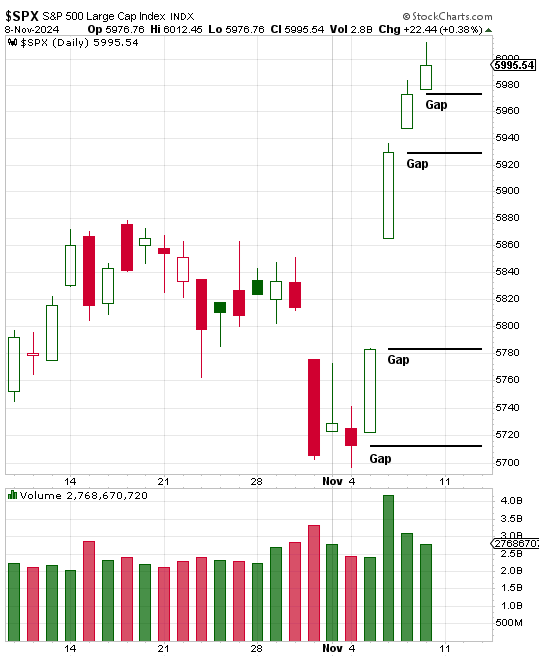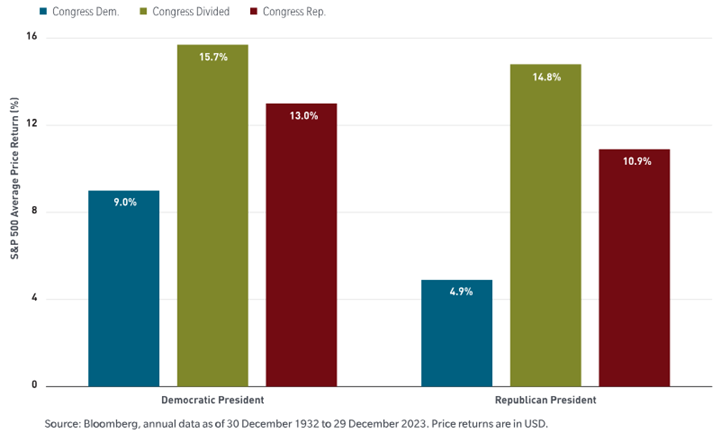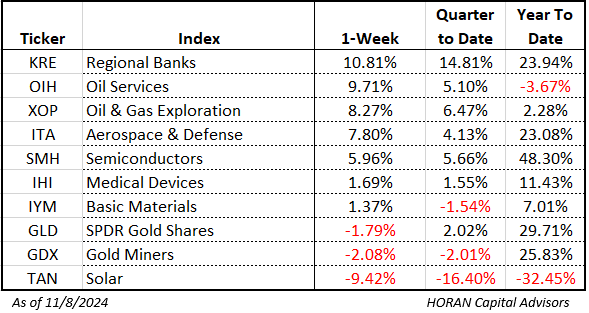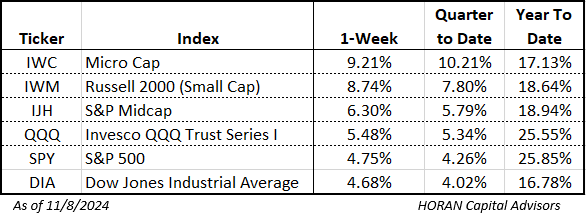Author: David I. Templeton, CFA, Principal and Portfolio Manager
The one word that comes to mind following the election last week is WOW! More to follow in the below commentary, but our firm advises our clients to not overreact one way or the other in the run up to any election. Following last Tuesday's outcome, it is evident many investors were caught out of the equity market as the uncertainty of the outcome faded. In a report by Morningstar they highlighted the significant flow of funds that poured into equities. Noted in the report was the fact,
"A 'monumental' $22 billion flowed into U.S.-listed ETFs on Wednesday, said Matthew Bartolini, head of Americas ETF research at State Street Global Advisors, in a phone interview. He said that marked record inflows for the day after a U.S. presidential election, 'shattering' the previous $4 billion record inflow seen in 2020 on the day after President Joe Biden was elected. The inflows reflected a 'risk-on' investment mentality, he said. 'It was like the market just got a bunch of candy and took off.'"
Evidence of this euphoria is seen in the market's performance following the election. Each day that followed the Tuesday election saw the S&P 500 Index gap higher at each daily open. From a technical perspective, investors might keep in mind these gaps can serve as a magnet and have a tendency to get filled down the road, i.e., on market pullbacks.

In client meetings we have shared information on the equity market's performance under different combinations of the political party controlling the two houses of Congress and the party occupying the Office of the President. Historically, on average, the market has done well under any combination of political party controlling the various branches of the government.

The point is investors tend to adjust their areas of investment focus depending on the potential policies that will be pursued by the party in power. Some of these adjustments began to occur last week. Below is a list of a few industry indexes or ETFs sorted by last week's return. President-elect Trump has stated oil drilling will be a focus of his administration and thus, oil service/oil and gas exploration stocks experienced a favorable bounce last week. Some of the alternative energy stocks experienced weakness like the solar stocks as seen below. The point is investors can find areas of the market that will be in favor based on potential policies pursued by the administration in office.

Lastly, as noted with the fund flow data above, investors are allocating investment dollars to stocks. In the U.S., and based on index returns, the year to date lagging micro-cap and small cap stocks saw the biggest returns last week as seen in the below table. Micro-cap stocks returned 9.21% nearly double the S&P 500 Index return of 4.75%.

Importantly, investors should not overreact to the election outcome. Stocks tend to go up over time and investors/the market adjust their areas of focus based on potential policies to be enacted. With that said, U.S. large company stocks have had strong returns this year and in fact over the last two years. This is a good time for investors to review their asset allocation and if overweight stocks, this might be a favorable time to reduce one's stock weighting back towards their long-term target allocation.
HORAN Wealth, LLC is an SEC registered investment advisor. The information herein has been obtained from sources believed to be reliable, but we cannot assure its accuracy or completeness. Neither the information nor any opinion expressed constitutes a solicitation for the purchase or sale of any security. Any reference to past performance is not to be implied or construed as a guarantee of future results. Market conditions can vary widely over time and there is always the potential of losing money when investing in securities. HORAN Wealth and its affiliates do not provide tax, legal or accounting advice. This material has been prepared for informational purposes only, and is not intended to provide, and should not be relied on for tax, legal or accounting advice. You should consult your own tax, legal and accounting advisors before engaging in any transaction. For further information about HORAN Wealth, LLC, please see our Client Relationship Summary at adviserinfo.sec.gov/firm/summary/333974.

